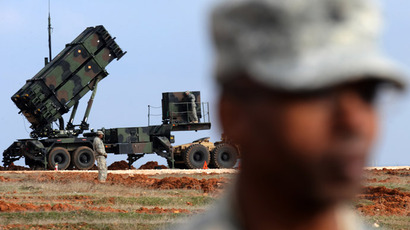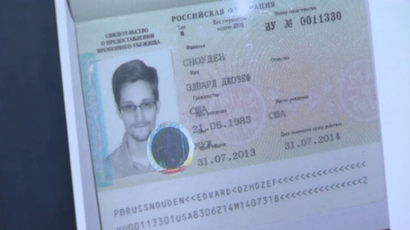Russia says 'no Cold War' with US but Obama wants to 'pause and reassess ties'
Russian Foreign Minister Sergey Lavrov says that Moscow and Washington are not in the midst of an argument over NSA whistleblower Edward Snowden, but President Barack Obama says a “pause” is needed in order to reassess America’s relationship with Russia.
The situation and tensions surrounding Snowden are “an
anomaly” in relations between Moscow and Washington, Lavrov
said in a Friday press conference.
“There’s no Cold War [between Russia and the US]. On the
contrary, we have the closest partnership and very good potential
for its improvement,” the Russian FM stressed.
The remark came after Sergey Lavrov's meeting with US Secretary
of State John Kerry as part of the so-called "2+2" talks in
Washington. Russian Defense Minister Sergey Shoygu and US Defense
Secretary Chuck Hagel also took part in the meeting.
To illustrate his point, Lavrov explained that “Edward Snowden
did not overshadow our discussions” and that this matter
should not dominate the more “mainstream” side of
Russia-US relations. He added that Russia would like “the
economy to be way more prominent in our relations” and that
the two countries have “laid a very solid foundation for
future work.”
Washington was “disappointed” by Russia’s decision to
grant temporary asylum to NSA leaker Edward Snowden, who revealed
secret American surveillance programs to the public in June.
Russia repeatedly said it cannot extradite the whistleblower, who
is wanted in the US on espionage charges, because there is no
legal basis for such action. The Foreign Minister again stated
that Russia acted in accordance with its own legislation and
international law. He also reiterated that the US has never
signed an extradition treaty with Russia.
Friday’s talks took place amid an escalation of tensions between
Moscow and Washington. On Wednesday, Barack Obama announced the
cancellation of his September visit to Russia and personal
meeting with Vladimir Putin due to disagreements on a number of
issues surrounding Snowden, missile defense, the Middle East, and
human rights.
Kerry, for his part, said that Russia-US relations are "marked
by both shared interests and, at times, colliding and conflicting
interests."

Despite any disagreements, Lavrov stressed that Obama’s visit to
Moscow wasn’t canceled, but rather “postponed.” He
expressed hope that the US President will eventually take
advantage of the invitation to meet with Putin in Moscow.
Earlier, the Kremlin said that Obama’s announcement came as no
surprise, adding that the move only shows that America “still
isn’t ready to build relations with Russia on equal footing.”
The US refuses to provide legally-binding guarantees that its
missile defense system in Eastern Europe – which is said to be
aimed at “rogue states” like Iran and North Korea - won’t
be targeting Russia. Moscow has warned of taking countermeasures
to maintain a strategic balance of forces.
The two countries have also taken a different approach to the
Syrian civil war, with the Kremlin supporting President Bashar
Assad and the White House supporting the rebels – despite a large
presence of Al-Qaeda affiliated militants within the opposition
ranks.
Moscow and Washington’s efforts to organize a peace conference in
Syria have so far been fruitless, mainly because there is no
unity among the country’s opposition. However, Kerry stated that
both the US and Russia agree that “to avoid institutional
collapse and descent into chaos, the ultimate answer is a
negotiated political solution." In return, Lavrov promised
that the two countries will meet again before the end of the
month to lay the groundwork for the much delayed Geneva-2
conference.
Although the Syrian opposition has still not come to an agreement
amongst itself, Lavrov said that Russia has managed to secure the
government of Bashar Assad to attend the talks without any
preconditions. In regards to the other side, he said that
"John Kerry assured me that the opposition would be persuaded
to come to Geneva without any preconditions on the basis of
reaching agreement with the government."
But the White House appears to be wanting more. A US official
said that "The test is not whether the Syrian government will
come to Geneva, [but] whether the Syrian government will come to
Geneva prepared to negotiate the transition of full executive
powers to a transitional governing body.”
Since May, attempts to set up the talks have been repeatedly
postponed. The UN and Arab League’s peace envoy to Syria, Lakhdar
Brahimi, now says there is no chance of anything happening before
August. The West has been nervous over the lack of progress ever
since Assad’s forces recently started gaining the upper hand on
the battlefield.
Both Russia and the US have decided that a transitional Syrian
government is the way forward, but have not yet come to an
agreement on whether President Assad should participate in its
formation.

‘Not appropriate to boycott Olympics’ - Obama
On Friday at a White House conference, US President Barack Obama
allayed fears that his relationship with President Putin was
souring, insisting that despite the Russian leader having
“that kind of slouch, looking like the bored kid in the back
of the classroom…when we're in conversations together, oftentimes
it's very productive." The President was referring to the
duo’s June meeting in Northern Ireland.
But acknowledging their differences has forced Obama to say that
the US will "take a pause, reassess where it is that Russia is
going."
"Frankly, on a whole range of issues where we think we can
make some progress, Russia has not moved," Obama said, adding
that "I think there's always been some tension in the
US-Russian relationship after the fall of the Soviet Union."
But despite any disagreements, Obama said that he does not think
boycotting the 2014 Sochi Winter Olympics is the correct move,
signaling that Americans will indeed be present at the games.
"I do not think it's appropriate to boycott the Olympics,"
he said.
"One of the things I'm really looking forward to is maybe some
gay and lesbian athletes bringing home the gold or silver or
bronze, which would I think go a long way in rejecting the kind
of attitudes that we're seeing there," he continued. And the
final remark on the matter was that “if Russia doesn’t have
gay or lesbian athletes, then, it’ll probably make their team
weaker.”














